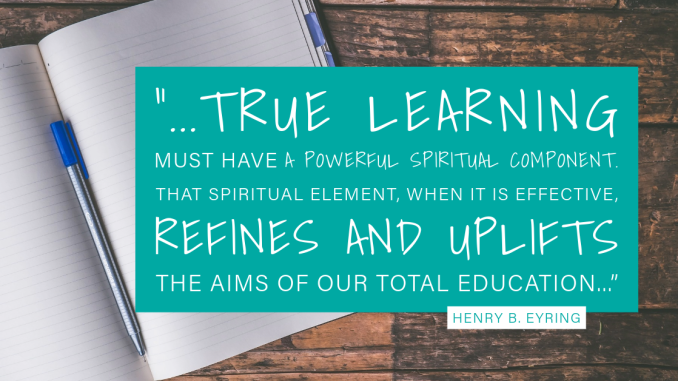
This week’s reflections on learning for the application phase of my Capstone Practicum Project are focused on “mindfulness.” Being mindful of actions and choices. Paying attention to the why behind the actions we take. I think this is important when we consider lifelong learning and the value of education throughout life. Why do we pursue the things we do?
Learning every day
Thinking about this Capstone Practicum Project and the very small time commitment required, I have to ponder what does not increase my stress with trying to graduate in July, this concept of mindfulness comes to mind repeatedly. Am I mindful of the time it is taking? Is the reflection of the validity of the application enough? Is focusing on the reason why I value daily informal education enough?
My problem is that I run from mediocrity in most things. I repeatedly ask myself, am I putting in more or less than required? Will this help? Is learning more going to improve the thing at hand?
When we live by a “learn something new every day” mindset, we tend to take a different perspective on learning. We see everything as a learning or teaching opportunity. We do not delay the opportunity to look something up or inquire quickly into something if for nothing more than to settle our curiosity. To me, this is learning every day – it is active but it is not premeditated or scripted.
It is what happens naturally when we “knock” and “ask.” From a spiritual standpoint, we know that asking and seeking are required from us to find the answers and guidance we desire. In the Book of Mormon, it reads…
7 Ask, and it shall be given unto you; seek, and ye shall find; knock, and it shall be opened unto you.
3 Nephi 14:7–8
8 For every one that asketh, receiveth; and he that seeketh, findeth; and to him that knocketh, it shall be opened.
If we knock, the door opens. When we ask, we receive. Seeking results in finding. Every step is a cause and effect where we are in charge of the action. It requires us to take action rather than be acted upon. When we are the ones initiating, we learn and retain more.
Seeking learning opportunities
Lifelong learners have a propensity for identifying learning opportunities in everything. Our very nature – our character – drives us to see what we do not know. Then we relate it to something we do know and understand and make concrete connections in our lives even if it is filed away as a “useless fact.” For us, even these useless facts have value as we fill up our experience database.
I grew up in a time when you had traditional card catalogs and librarians. I had the foolish notion that librarians knew everything. The reality is that their mentality was different and how they associated things in the world around them helped them draw and create new and unique connections. They simply ask a lot of “what if” questions. When we ask these questions we figure out how to take the impossible and create endless possibilities.
Are we seeking for these opportunities? Are we asking the questions?
Knowing a lot helps you learn more
Someone asked me how I knew so much about so many things. I had to stop and think for a second before responding. It is not because I have an incredible knowledge bank of information. My brain cannot instantaneously access everything that I know. I am actively rehashing information all the time.
We are blessed to have access to phones, iPads, and computers that can and do open up the world of information to us to access the minute we want it. Do we use these tools for our betterment?
The next time you have the thought “What does that mean?”, I challenge you to not sit there and to take action. Turn your confusion into active learning. If you cannot stop right then, jot down in the notes app on your phone the idea and make a pointed effort to return to the topic as soon as you can.
It takes only a couple of seconds to look up the general definition of a word on your phone. Those two seconds increase the size of your knowledge database, giving you one more thing to create unique connections or draw relationships with other things. You never know when the information may become relevant in your life. You never know when you may have chance encounters with an individual who you can draw a personal connection with because of something you know.
It takes only a couple of seconds to open up a website in a browser about the new store opening next week down the street. It only takes a couple of minutes to discover a little bit of history about the company, its mission, products, and more. How many times have we favored one business over another because we know it already?
Learning is spiritual
Our character – our inner being – is a driving force behind who we are and who we want to become. This is from something outside of ourselves, a higher power if you want. This does not have to be the same God that I worship, but the fact remains that each of us has some sort of spiritual component to us and it acts as our moral compass.
I have never failed to recognize the blessings in my life that have come from learning something. I have helped people find resources they have missed or overlooked. I may not know or understand the topic they are struggling with, but having an awareness helped me to give them a different perspective with which to approach their problems.
How we learn in the world can be applied to how we learn spiritually. It can help us increase our faith and draw closer to Heavenly Father and Jesus Christ. This can in turn help us to seek opportunities to learn secularly that will further enhance our lives and those of people we know around us. It can help us serve and uplift those around us.
To read more about the Capstone Practicum Project, please reference the following tags: BYU-Idaho and REL 333 – Capstone Practicum Project.




Be the first to comment